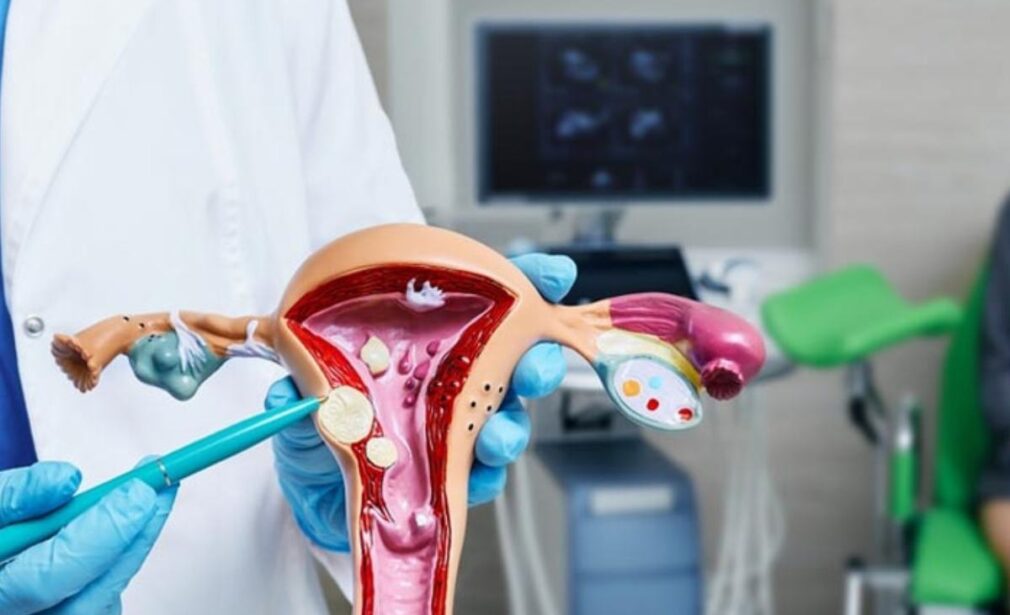Delivering world class medical care
Fibroids: Causes, Symptoms, and Treatment Options
Women’s reproductive health is intricate, and conditions like fibroids are common but often misunderstood. Uterine fibroids are benign growths in the uterus, and while some women experience no symptoms, others may face significant discomfort or complications. Simran IVF, located in Mohali, Chandigarh, and Amritsar, specializes in diagnosing and treating fibroids, ensuring personalized care for every patient.
Understanding Fibroids
Fibroids are non-cancerous tumors that develop in or around the uterus. They vary in size, from tiny, seed-like growths to large masses, and can occur singly or in clusters. While most fibroids are benign, rare cases involve malignant growths like leiomyosarcoma. The exact cause of fibroids remains unknown, but they are strongly linked to hormonal imbalances, particularly high levels of estrogen and progesterone.
Fibroids can appear at any age during a woman’s reproductive years and are most commonly diagnosed in women over 30. Up to 40% of women experience fibroids at some point, and many remain undiagnosed due to the absence of symptoms.
How Fibroids Develop
Fibroids originate from the muscular layer of the uterus, called the myometrium. They grow in response to hormonal stimulation and often expand during pregnancy when hormone levels are elevated. They can form inside the uterine cavity, within the uterine wall, or on the external surface of the uterus, sometimes connected by a stalk-like structure.
Symptoms of Uterine Fibroids
Symptoms of fibroids depend on their size, location, and number. While some women remain asymptomatic, others may experience:
- Heavy or prolonged menstrual bleeding
- Severe menstrual cramps
- Pelvic pain or pressure
- Abdominal swelling or bloating
- Frequent urination or difficulty emptying the bladder
- Painful intercourse
- Constipation or difficulty with bowel movements
In severe cases, fibroids can lead to anemia due to excessive blood loss or fertility issues, including difficulty conceiving and pregnancy complications.
Types of Fibroids
Fibroids are categorized based on their location in the uterus:
- Intramural Fibroids: The most common type, developing within the uterine wall.
- Subserosal Fibroids: These grow on the outer surface of the uterus and can become quite large.
- Submucosal Fibroids: Found in the uterine cavity, these fibroids are often linked to infertility and heavy bleeding.
- Pedunculated Fibroids: Attached to the uterus by a stalk, these fibroids resemble mushrooms.
- Cervical Fibroids: Rare fibroids that form in the cervix, the lower part of the uterus.
Causes and Risk Factors
While the exact cause of fibroids is unknown, several factors contribute to their development:
- Hormonal Imbalances: Elevated estrogen and progesterone levels stimulate fibroid growth.
- Genetic Factors: A family history of fibroids increases the risk.
- Ethnicity: Women of African descent are more likely to develop fibroids.
- Age and Weight: Fibroids are more common in women over 30 and those who are overweight or obese.
- Other Factors: Substances like insulin-like growth factors and extracellular matrix (ECM) can influence fibroid growth.
When to See a Doctor
It’s essential to consult a specialist if you experience persistent pelvic pain, heavy menstrual bleeding, or difficulty with bladder or bowel functions. Simran IVF in Mohali, Chandigarh, and Amritsar offers advanced diagnostic tools, including ultrasounds and MRIs, to detect and evaluate fibroids.
Treatment Options for Fibroids
Treatment depends on the size, location, and severity of symptoms, as well as the patient’s desire for future pregnancies.
1. Medications
Hormonal treatments, such as gonadotropin-releasing hormone (GnRH) agonists, can shrink fibroids. Nonsteroidal anti-inflammatory drugs (NSAIDs) like ibuprofen may help alleviate pain.
2. Surgical Procedures
- Myomectomy: A minimally invasive surgery to remove fibroids while preserving the uterus, ideal for women planning to conceive.
- Hysterectomy: The complete removal of the uterus, recommended for severe cases where fertility preservation is not a concern.
- Uterine Fibroid Embolization (UFE): A non-surgical procedure that cuts off the blood supply to fibroids, causing them to shrink.
3. Lifestyle and Supportive Care
Maintaining a healthy weight, managing stress, and adopting a balanced diet can help reduce the risk of fibroid growth.
Fibroids and Fertility
Fibroids can interfere with conception and pregnancy by altering the shape of the uterus, blocking fallopian tubes, or disrupting implantation. However, many women with fibroids can have successful pregnancies with proper treatment and monitoring.
At Simran IVF, specialists assess the impact of fibroids on fertility and provide tailored solutions, including IVF and other assisted reproductive technologies.
Why Choose Simran IVF for Fibroid Treatment?
Simran IVF is a trusted name in reproductive healthcare in Mohali, Chandigarh, and Amritsar. With state-of-the-art facilities and a team of experienced doctors, the clinic offers comprehensive care for fibroids and related conditions. From advanced diagnostic tools to minimally invasive surgeries, Simran IVF ensures the best outcomes for every patient.
Online simple step for appointment
To make an appointment at Simran IVF, simply reach out through our contact page, where you can fill out an easy form to schedule a consultation. Our team will get back to you promptly to confirm your appointment details. Alternatively, you can call our office directly to speak with one of our friendly staff members, who will assist you in selecting a convenient time for your visit. We look forward to supporting you on your fertility journey!

Make Appointment

Select Doctor


